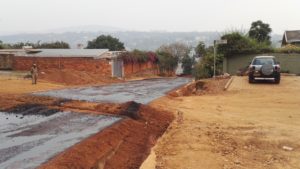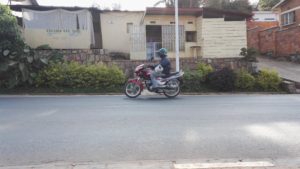In this post I’ll be covering some of the less obvious aspects of residing in Kigali, Rwanda, ranging from bicycles, plastic bags and tarmac.
Tarmac (and broken windows)
Why would you want to tarmac a road?
This is a question that I’d never really considered, however within a few days of landing I found myself in the middle of a conversation about it several times.
You see a lot (but not all) of the streets in the city are smoothly tarmacked and I’ve noticed a lot of them getting a makeover in the short time I’ve been here.

With my economist hat on I’ve been trying work out the cost-benefit of doing so.
From people who have a better grasp of road construction than I, it seems that the majority of upside in driving performance comes from smoothing out the bumps in the road, which isn’t dependent on tarmac. Many smooth “dirt” roads drive just fine, and adding an additional layer of tarmac offers only marginal upside.
Resource is finite, so why go to the effort and expense of doing it then?
It might well be to do with image.
Having welcoming tarmac roads is a great signal that this is a professional economy that people want to do business in, an important part of the Rwandan strategy to attract foreign investment.
This isn’t some distant, backward land, look we have tarmac roads like you do back home!
As bad as it sounds, a foreign investor may touch down in Rwanda and gulp at scenes of dusty taxis driving around, regardless of the fact that she’d be in transit for the same length of time were the roads tarmacked.
So you could say that the intangible benefit of a tarmacked road far outweighs the tangible.
Which brings us to broken windows.
Broken windows
The broken window effect is something I’d not heard of before but was a common reply when I was rabbiting on about tarmac to anyone who listened.
In general, the idea is that if juveniles see broken windows, they’re more likely to commit a crime. By fixing them, the economy isn’t necessarily substantially stronger for better insulated buildings, but having streets where the status quo is intact window panes makes people less likely to go and do bad things.
If a neighbourhood has pristine buildings, the signal is that this is not a place where bad things happen, and so people are (whether consciously or not) more inclined to keep it that way.
Which again is an example of an intangible benefit outweighing the tangible benefit of a policy choice.
And I guess is why people brought it up.
Speeding
From what I’ve seen there isn’t an abundance of speed cameras
There is however a roadside police presence with speed guns.
The fine for speeding is ~£20 but the way in which it’s paid is particularly interesting.
- The cop signals to the driver to pull over
- The driver winds down the window as the cop takes a long intake of break and says “Now I will punish you”
- The driver looks despondent, and hands over his driving licence in exchange for a speeding ticket
- The driver then goes to the nearest bank and pays the fine in exchange for a receipt
- The driver returns to the spot where the cops are and exchanges the receipt for the licence
- The driver meekly drives off. The cop returns to beaming his speeding gun at passers by
This series of events frequently requires a round trip of multiple hours and might seem like a classic piece of government bureaucracy.
What it does though is remove the element of cash changing hands from dealings with public officials, part of the ever-present campaign to stamp out corruption here in Rwanda.
Plus, whenever something is deemed a ball ache, I guess it should reduce the likelihood of wanting to try something on…
Toyota is king
On the subject of cars, there are simply loads of Toyotas in Kigali.
At first I didn’t think much of it, but as soon as I began noticing, they cropped up… everywhere.
I recently had 10 minutes to kill whilst waiting by a road-side and so decided to undertake a quasi-scientific experiment to test the hypothesis. Of the 34 cars that drove past, 29 were Toyotas.
That’s crazy high, right?
I’ve spoken to people here about why this might be and have heard
- They are cheap, reliable and spare parts are obtainable
- There is a Rwandan tendency to “follow the leader” – if it works for your neighbour, why bother trying something new
and so they might be here to stay.
A Hyundai dealership has popped up near to where I live, but as yet it doesn’t seem to have had much success.
Bicycles
Rwanda is hilly, and yet that doesn’t deter the cyclists.
By default the bikes here are built to give someone a backy, with a frame over the rear wheel having some sort of cushion.
Out of the city friends are often substituted for agricultural produce (I’ve seen vegetable and mineral, but so far not animal) and to date, I have spotted a grand total of one bicycle helmet.
Plastic bags
There aren’t any. At least at the shops.
In efforts to keep the country clean there is a ban on non-biodegradable bags living here.
Doing my shopping here makes me feel like a housewife in a 1950s American movie as I trot out with a big tall brown paper bag full of veg.
Inner city transport
I’m only speaking of Kigali here, but the main way in which people get around is on the back of a motorcycle (pronounced “moto”).

I’ve found that it roughly equates to 6p/ min, so you have to go pretty far (or look particularly green) to spend a £1. They carry a spare helmet with them and so once you flag one down there’s a quick back and forth about price, and then you hop on the back.
For support I was told that you grab a handle behind you, rather than cuddle the driver.
There seems to be a steep learning curve with how the inner city buses operate which I’ve not yet explored.
Electrical appliance shopping
I recently had an experience of what life was like before Amazon (which doesn’t yet have a presence in the region).
In the market for a microphone, I went to “the market” in town and inquired with the many electrical shop owners if they could sell me such a device for my computer.
There was much back and forth trying to explain what I was I after as the shopkeepers invariably went out back and returned to present me with either a headset, some speakers or even at one place a kareoke machine.
Politely declining and moving to next potential retailer (which was almost always next door) I eventually found a shop in the one of the malls where, after a bit of a haggle, I was able to purchase something which was kind of what I was after.
Ecommerce isn’t really a thing here yet, but it might be soon.
Sunlight
So far the sun has regularly gone down at around 6pm and risen at 6am. I’ve found that this shifts the order of activities to be done in a day, and have found myself conforming accordingly.
I was speaking to a friend here who said that it is pretty much the same deal all year round.
At first I was surprised. But then I realised I shouldn’t be, because Rwanda is right by the equator and so it makes sense that the days are the same length regardless of the Earth’s relative position to the sun.
Isn’t it funny how science you learn in a textbook ends up being true in real life…
The expat scene
I’ll close this post with a small section on the expat community in Kigali.
The majority of my interactions with the city have been through the large, but finite, community of non-native Rwandans living in the city.
There are often comments of how the city is small. After meeting a bunch of people on my first night (at an arts cafe and drinks at the British High Commission), I don’t think I’ve had a social event where I’ve not bumped into someone I’d previously met.
This means you could easily go through living here interacting with only mzungus (slang for Europeans/ foreigners) though with a little effort it’s very easy to make friends outside of the clan.
In terms of resources, there is the Living in Kigali website and a Facebook group where expats share recommendations/ information. Beyond word of mouth, the Facebook group seems to be the way to recruit new housemates, and unless you’re a recluse it’s typically just two degrees of separation between people.
Conclusion
This ties up the less obvious observations I’ve jotted down since I’ve arrived here. No doubt more will follow, but my next area of focus will be the emerging business scene here in the country…